This brief mention of King Omri in the Bible belies his monumental legacy, hinting at a story much larger than the text reveals.
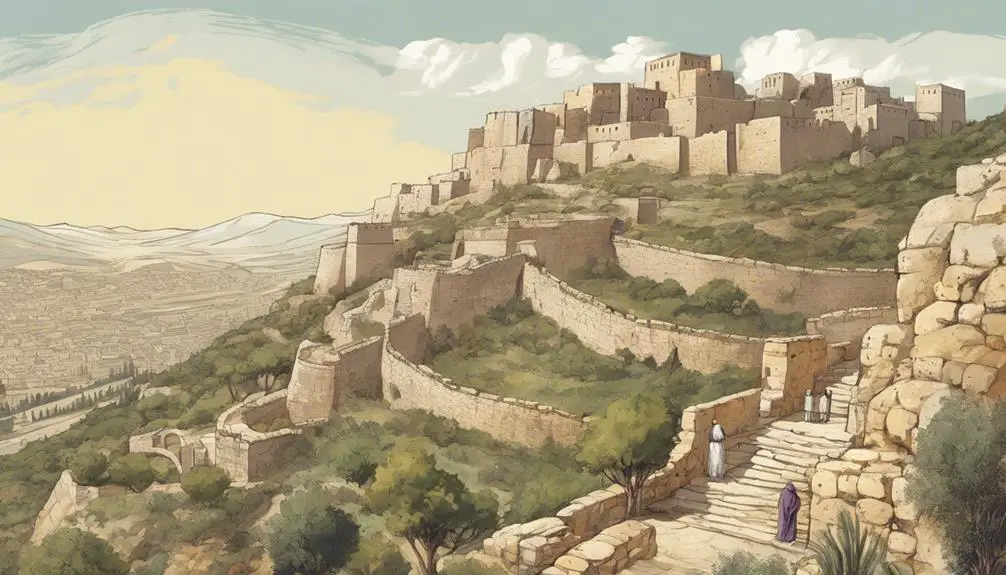
King Omri in the Bible
Despite his significant contributions, King Omri is mentioned only eight times in the Bible, a stark contrast to his notable legacy in the archaeological record. You might find this disparity intriguing, especially considering Omri's impactful political maneuvers and architectural projects that left an indelible mark on the Northern Kingdom of Israel.
His strategic marriage alliances and the establishment of the Omride Dynasty underscore a savvy understanding of power and diplomacy. As you explore further, you'll uncover how his achievements and the subsequent actions of his successors shaped the region, offering a richer perspective on his relatively brief biblical mention and why his legacy deserves a closer look.
Key Takeaways
- King Omri established Samaria as Israel's capital, impacting its religious and political landscape.
- His reign was marked by strategic military expansions and economic prosperity.
- Omri's pragmatic approach to Yahwism balanced tradition with political alliances.
- Despite his achievements, biblical accounts often criticize Omri for idolatry and evil deeds.
The Ascension of Omri
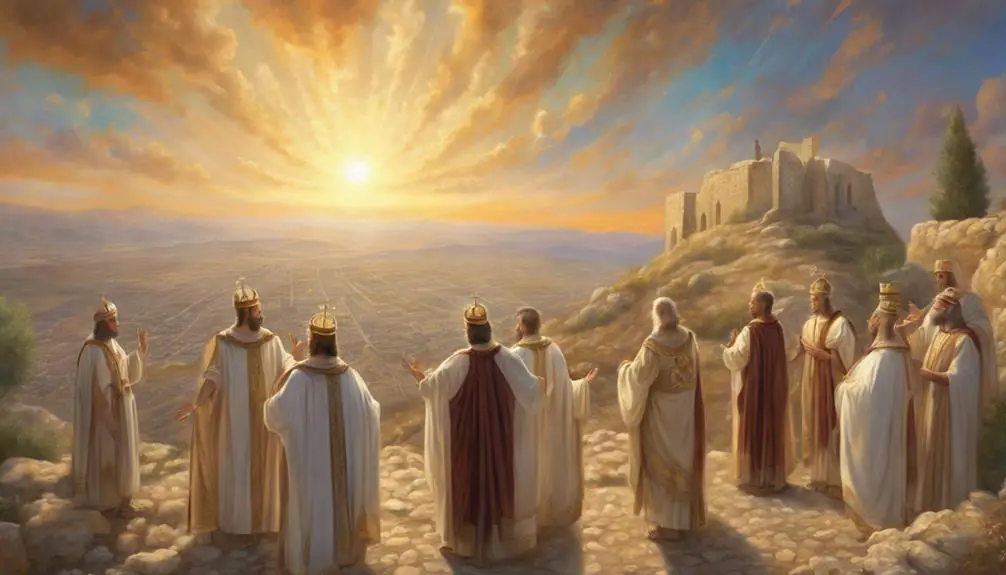
Omri's ascent to the throne of Israel, marked by strategic brilliance and political acumen, represents a pivotal chapter in the biblical narrative. His use of military tactics not only secured his position but also set a precedent for the strategic operations of the Israelite army. Omri didn't just rely on brute force; his maneuvers were calculated, leveraging both the terrain and alliances to his advantage. This approach not only solidified his reign but also expanded the borders of Israel, showcasing his understanding of warfare and diplomacy.
His religious policies, though controversial, were equally strategic. Omri navigated the complex religious landscape of Israel with a kind of pragmatism that was both revered and criticized. By establishing Samaria as his capital and investing in its development, he inadvertently influenced the religious practices of the region. His policies reflected a balance between traditional Yahwism and the political realities of his time, aiming to unify the diverse populations under his rule. This delicate balance of military prowess and religious policy-making underpins Omri's legacy, illustrating the multifaceted nature of his leadership and his profound impact on the history of Israel.
Omri's Political Achievements
Having explored the strategic brilliance behind Omri's ascent, we now turn our attention to his political achievements, which further cemented his legacy as a formidable leader of Israel. You'll find that Omri's tenure was marked by shrewd diplomacy and effective military strategies, positioning Israel as a significant power in the ancient Near East.
Omri's alliances were particularly noteworthy. He adeptly navigated the complex geopolitical landscape, forging partnerships that enhanced Israel's security and economic prosperity. His marriage alliance with the Phoenician kingdom, through his son Ahab's union with Jezebel, is a prime example. This move not only secured a powerful ally but also facilitated trade routes and access to resources, bolstering Israel's economy and military capabilities.
Moreover, Omri's military campaigns further demonstrated his political acumen. He expanded Israel's territory and fortified its borders, ensuring the kingdom's safety against external threats. His conquests and the strategic establishment of the capital in Samaria showcased his understanding of military strategy and urban planning.
In essence, Omri's political achievements underscore his legacy as a visionary leader. His ability to secure pivotal alliances and execute successful military campaigns solidified Israel's position in the region, laying the groundwork for its prosperity.
Architectural Projects and Innovations
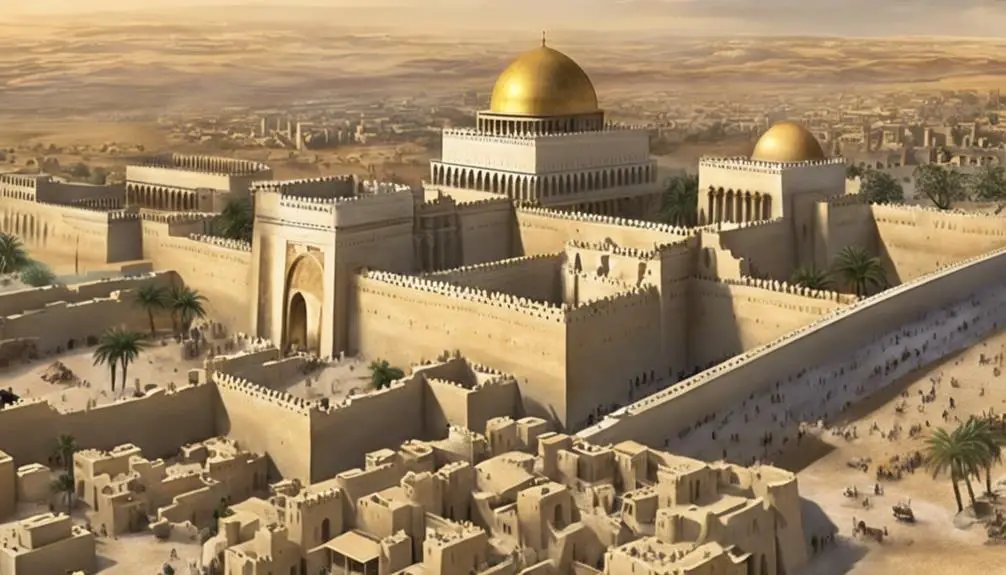
A significant aspect of King Omri's legacy lies in his groundbreaking architectural projects and innovations, which not only transformed the urban landscape of ancient Israel but also reflected his strategic prowess and vision for the nation's development. You'll find his mark in the sophisticated construction methods and urban planning strategies that were ahead of their time.
Omri's construction methods were revolutionary, employing advanced techniques that allowed for the creation of fortified cities and complex structures. These innovations weren't solely for defense; they also facilitated the growth and prosperity of the kingdom. His urban planning skills are evident in the layout of these cities, which were designed for both efficiency and expansion. The strategic placement of buildings, roads, and public spaces demonstrated a keen understanding of civil engineering and urban development.
His projects were more than just feats of engineering; they represented a vision for a prosperous, secure, and well-organized kingdom. Through these architectural endeavors, Omri laid down a foundation that would influence the development of Israel long after his reign. This aspect of his legacy showcases how his contributions to construction and urban planning have left an indelible mark on the history of ancient Israel.
The Omride Dynasty
Beyond his architectural achievements, King Omri's establishment of the Omride Dynasty marked a pivotal era in ancient Israel's history, characterized by political strength and international prominence. His tenure ushered in a period of significant development, with far-reaching impacts on the region's socio-political landscape.
Central to Omri's reign were his strategic religious policies and the establishment of foreign alliances. These maneuvers not only secured Israel's borders but also elevated its status among neighboring states. Let's delve into the imagery that defines this era:
- Majestic palaces and fortifications symbolizing the dynasty's power and wealth.
- Bustling markets and trade routes, evidence of prosperous foreign alliances.
- Diverse religious practices reflecting both traditional beliefs and external influences.
- Diplomatic envoys traveling to distant lands, showcasing Israel's outreach and influence.
- Inscriptions and records, immortalizing the dynasty's achievements and Omri's legacy.
Through these elements, you can visualize the dynamic and influential chapter in Israel's history that was the Omride Dynasty. Omri's policies laid the groundwork for a flourishing state that balanced traditional religious practices with the pragmatism of international diplomacy. This era stands as a testament to the complexities and achievements of ancient Israel under Omri's rule.
Legacy and Historical Perspectives
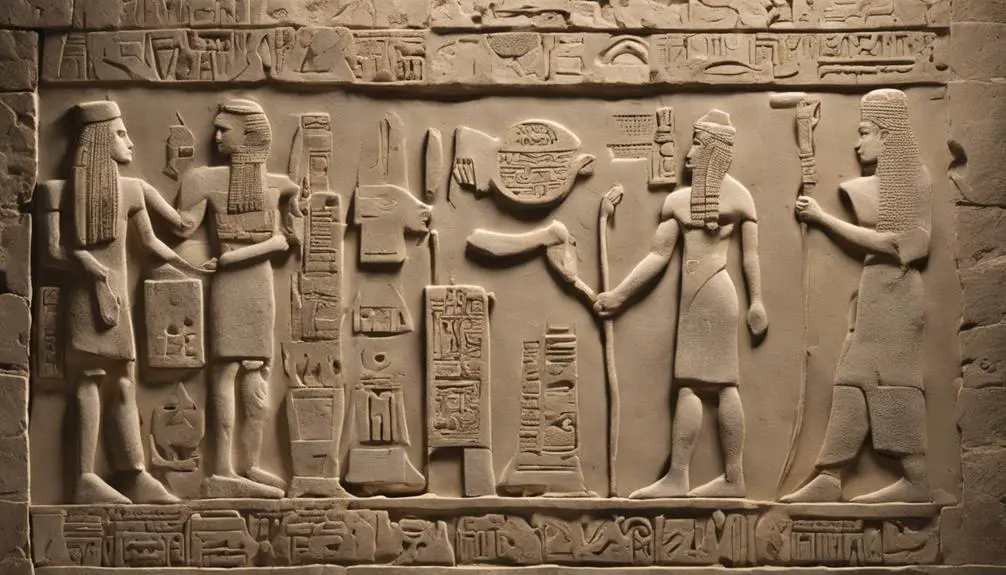
Through the lens of time, King Omri's legacy emerges as a cornerstone of ancient Israel's storied past, shaping historical perspectives with its profound impact on the nation's identity and geopolitical standing. You'll find his reign marked by significant religious reforms and military campaigns that not only solidified his power but also left enduring marks on the fabric of Israelite society and its surroundings.
To understand the breadth of Omri's influence, consider the following aspects:
Aspect |
Impact |
|---|---|
Religious Reforms |
Omri's religious policies, while controversial, sought to unify the nation under a common worship system, influencing subsequent rulers. |
Military Campaigns |
His strategic military initiatives expanded Israel's borders and established lasting alliances, enhancing the kingdom's security. |
Geopolitical Standing |
Omri's diplomatic endeavors placed Israel on the map as a significant player among neighboring states. |
National Identity |
By fortifying Israel's position, Omri contributed to a burgeoning sense of national pride and identity among his people. |
His strategic foresight in both religious and military spheres has earned him a revered place in history. Omri's legacy, analyzed with reverence and scholarly attention, reveals a leader whose actions reverberate through time, offering lessons on governance and the complexities of leadership in the ancient world.
Frequently Asked Questions
What Religious Practices and Beliefs Characterized Omri's Reign, and How Did They Diverge From or Align With Traditional Jewish Worship?
You're exploring how religious practices and beliefs during a certain reign deviated or aligned with established worship norms. Specifically, Omri's idols and sacrificial practices come into focus. These elements starkly contrast with traditional Jewish worship, which strictly opposes idolatry and has well-defined sacrificial rites.
This divergence highlights a significant shift, suggesting that Omri's reign introduced practices that significantly deviated from the foundational beliefs and rituals of the Jewish faith.
How Did King Omri's Diplomatic Relationships With Neighboring Countries Influence Israel's Economic and Military Status in the Region?
When examining how a ruler's diplomatic ties with neighboring countries can elevate a nation's economic and military prowess, it's pivotal to consider the impact of trade and military alliances.
These alliances not only bolster a country's defense capabilities but also enhance its economic stability through increased trade opportunities.
Thus, strategic diplomacy can play a crucial role in shaping a nation's standing in the regional and global arena, ensuring prosperity and security.
Are There Any Archaeological Findings That Directly Contradict or Challenge the Biblical Account of Omri's Life and Reign?
You're diving into a whirlpool of history when questioning the archaeological evidence against Omri's reign. Specifically, the debate over inscriptions and Omri's capital has scholars on the edge of their seats.
While some findings seem to challenge the biblical narrative, the evidence isn't as clear-cut as you'd think. The inscription debate particularly offers more questions than answers, inviting a scholarly reverence towards the complexities of ancient history.
How Has Modern Scholarship Reevaluated Omri's Contribution to the Development of the Israelite State Compared to Biblical Narratives?
You've noticed modern scholars are rethinking Omri's legacy, specifically his political strategies, compared to biblical stories. They now see his contributions to the Israelite state's development as more significant than narrated. This shift in perspective highlights his savvy in governance and diplomacy, underscoring a reverence for his strategic mind.
It's clear, Omri's role was pivotal, influencing the state's trajectory far beyond the biblical portrayal, inviting a deeper appreciation for his historical impact.
What Role Did Queen Omri's Wife and Family Play in His Administration, and Are There Any Significant Figures Among His Descendants Not Covered in the Mainstream Biblical Narrative?
You're exploring how family dynamics and marriage alliances played pivotal roles in ancient leadership. Specifically, you're keen on understanding the significant impacts of a ruler's wife and family on his administration.
While mainstream narratives mightn't highlight them, there are indeed noteworthy figures among his descendants that shaped history. Analyzing these unspoken contributors offers a deeper insight into the complexity and influence of family ties in ancient governance structures.
Conclusion
In sum, Omri's reign marks a pivotal chapter in biblical history, showcasing his astute political maneuvering, architectural ingenuity, and the establishment of a dynasty that shaped Israel's destiny.
His legacy, a testament to the adage 'Rome wasn't built in a day,' illustrates the profound impact of visionary leadership over time.
Analyzing Omri's contributions offers not just a window into ancient politics and culture but also a reflection on the enduring nature of human ambition and its marks on civilization.


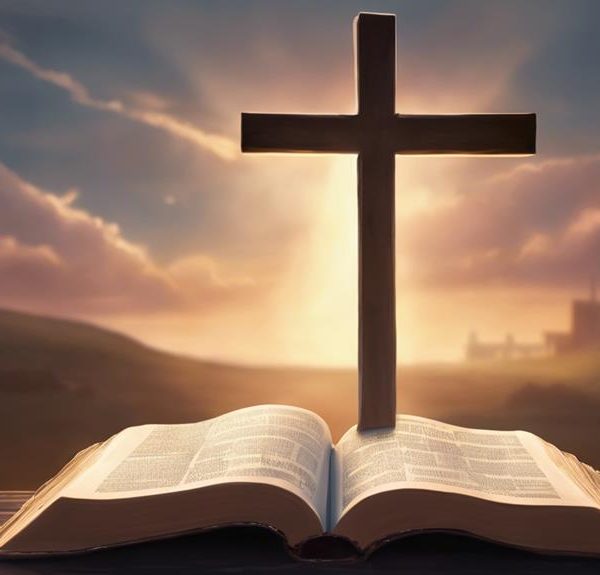
Sign up